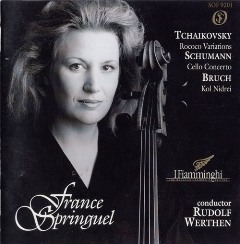France Springuel Play Schuman - Tchaikovsky - Bruch
France Springuel Play Schuman - Tchaikovsky - Bruch

1 Concerto for Cello and Orchestra in A minor opus 129 29:30 2 Variations on a Rococo Theme for Cello and Orchestra opus 33 22:50 3 Kol Nidrei opus 47 11:01 France Springuel - cello I Fiamminghi (Orchestra) Rudolf Werthen - conductor
The Cello Concerto in A minor, Op. 129, by Robert Schumann was completed in a period of only two weeks, between 10 October and 24 October 1850, shortly after Schumann became the music director at Düsseldorf. The concerto was never played in Schumann's lifetime. It was premiered on 9 June 1860, four years after his death, at the Leipzig Conservatory in a concert in honour of the 50th anniversary of Schumann's birth, with Ludwig Ebert as soloist.
The concerto is considered one of his more daring and adventurous works, due to the length of the exposition and the transcendental quality of the opening. On the autographed score, Schumann gave the title Konzertstück (concert piece) rather than Konzert (concerto), which suggested he intended to depart from the traditional conventions of a concerto from the very beginning.
The Variations on a Rococo Theme, Op. 33, for cello and orchestra was the closest Pyotr Ilyich Tchaikovsky ever came to writing a full concerto for cello and orchestra. The style was inspired by Mozart, Tchaikovsky's role model, and makes it clear that Tchaikovsky admired the Classical style very much. However, the Thema is not Rococo in origin, but actually an original theme in the Rococo style.
Tchaikovsky wrote this piece for and with the help of Wilhelm Fitzenhagen, a German cellist and fellow-professor at the Moscow Conservatory. Fitzenhagen gave the premiere in Moscow on November 30, 1877, with Nikolai Rubinstein conducting. This was perhaps the only hearing of the Variations as Tchaikovsky wrote the piece until 1941, when it was played in Moscow without Fitzenhagen's by-then-standard emendations.
Kol Nidrei, Op. 47, is a composition for cello and orchestra written by Max Bruch. Bruch completed the composition in Liverpool, England, before it was first published in Berlin in 1881.
It is styled as an Adagio on 2 Hebrew Melodies for Cello and Orchestra with Harp and consists of a series of variations on two main themes of Jewish origin. The first theme, which also lends the piece its title, comes from the Kol Nidre prayer which is recited during the evening service on Yom Kippur. In Bruch's setting of the melody, the cello imitates the rhapsodic voice of the hazzan who chants the liturgy in the synagogue. The second subject of the piece is quoted from the middle section of Isaac Nathan's arrangement of "O Weep for Those that Wept on Babel's Stream", a lyric which was penned by Lord Byron in a collection called Hebrew Melodies.
Bruch was a Protestant and first became acquainted with the Kol Nidre melody when his teacher Ferdinand Hiller introduced him to the Lichtenstein family, the head of which served as the cantor-in-chief of Berlin. Cantor Abraham Jacob Lichtenstein was known to have cordial relations with many Christian musicians and supported Bruch's interest in Jewish folk music. While some commentators have criticized the dearth of Jewish sentiment in Bruch's concert-hall Kol Nidrei, Bruch never presumed to write Jewish music. He only wished to incorporate Jewish inspirations into his own compositions. ---wikipedia
download: uploaded anonfiles mega 4shared mixturecloud yandex mediafire ziddu








